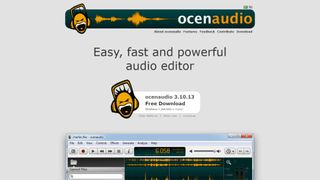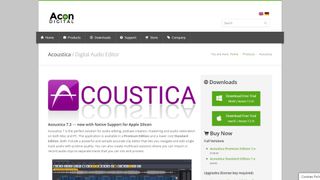The best free audio editors make it simple and easy to manage audio files in a wide range of file types, for both music production as well as for internet broadcasting such as for podcasts and YouTube.
The best free audio editors
Free audio editors can be surprisingly powerful, and we’ve rounded up the very best ones for the job, whether you’re making your own podcasts, mixing music, or just trimming a sound recording to a particular length.
The best free audio editor is Audacity – a feature-packed open source program that offers more features than many commercial alternatives. It supports almost every audio format you can name, allows for live streaming, and is packed with a vast range of plugins.
Audacity won’t be the right choice for every project though, and if you only need to shorten a sound file or adjust its volume, one of the simpler tools in this roundup might be a more suitable option. Scroll down for our full guide to the very best free audio software, with something for every job and skill level.
The best free audio editing software overall is Adobe Audition
Adobe Audition is a comprehensive toolkit for audio, allowing for multitrack, waveform, and spectral display for the mixing, editing, and restoring of audio. It’s not free like the options below, but the result is the ability to polish the finishing for standalone audio as well as video. This powerful audio app is available either as a standalone or as part of the Adobe Creative Cloud.View Deal
For tech-savvy users or those willing to spend a few minutes learning how to navigate Audacity’s slightly intimidating interface, this is the best free audio editor.
Audacity is an open-source product that works on Mac, Linux, and Windows devices. Over the years, it has developed an enormous developer following, meaning it’s constantly being updated with new features and plugins to keep it competitive with other audio editors.
One of the best third-party Audacity plug-ins is Gsnap, which allows you to add autotune effects to your sounds. With this audio editor, you can edit pre-recorded files, capture new sounds, add effects, and stream podcasts.
While beginners may be intimidated by the complicated visual look of the Audacity interface, it’s surprisingly user-friendly with lots of screen real estate dedicated to showing you the waveforms of your tracks and large buttons for important actions like starting and pausing recordings.
If you find the Audacity interface a little overwhelming but don’t want to compromise on any features, Ocenaudio is an excellent free audio editor to consider installing. This open-source platform plays well with Windows, Apple, and Linux devices.
Compared to other free audio editors, Ocenaudio stands out for its ability to let you preview effects in real-time. Most tools force you to edit “destructively”, which means modifying the original audio file that you’re working with. However, with Ocenaudio, you can adjust your playback parameters directly. As a result, when you change an effect like reverb in Ocenaudio, you’ll hear the difference immediately.
Ocenaudio can work with files hosted on cloud servers as well as those stored on your local PC. Some users find the interface a little sparse, but most appreciate its clean and colorful design. If you plan to edit frequently, the best thing to do is memorize some of Ocenaudio’s in-built keyboard shortcuts which will make your work significantly more efficient.
Ashampoo Music Studio is a Windows-only audio editor and a great option for users who need to modify a sound file for the first time.
This tool’s audio file editing interface is incredibly easy to use with a large waveform preview window taking up most of your screen, and buttons for key functions like cutting and pasting sections of your audio displayed below it. With Ashampoo, you don’t get multi-track support so this audio editor is best suited to rearranging simple audio clips.
As the name suggests, Ashampoo Music Studio is more than a basic audio editor. You can actually use this freeware to design CD labels, edit file metadata tags, convert between different audio formats, and rip or burn discs.
Audiotool is a free online platform that allows you to create and publish music tracks. Unlike other free audio editing software packages listed here, Audiotool is an in-browser platform so there’s no need to install a local client to use it, although a Chrome plugin is available.
This audio editor shares more DNA with Apple’s Garage Band program than most audio editors. With it, you can record 30-second segments of sound to use as samples that can then be mixed with digital instruments already built into the Audiotool system.
You can modify your tracks with Audiotool by adding filters from a selection of 14 different effects. You can also create a MIDI controller within the program or use a splitter tool to attenuate and modify your audio signal.
Another excellent free audio editor with comparable features to Audacity is Acoustica, which is produced by Acon Digital. Acoustica is actually a premium subscription product, and no free version of the latest release, Acoustica 7, is available. However, you can install older versions of the software such as Acoustica 6 for free.
One of the big advantages of Acoustica 6 over open-source alternatives is its professional look-and-feel. The interface wouldn’t look out of place in a top-end recording studio and, thanks to sensible design choices, it only takes a few minutes to get to grips with.
If you like Acoustica’s setup, you can expand its feature set by installing VST or DirectX plugins. With these, you’ll gain access to a wide range of new sound effects that can help you fine-tune your tracks to produce the result you’re looking for.
A unique element of Acoustica is the so-called “Effect Chain” area. Here, you can layer up different audio filters and then apply the combination to multiple tracks. This is a great way to create a unique mix or ensure your sound stays consistent throughout an album.







